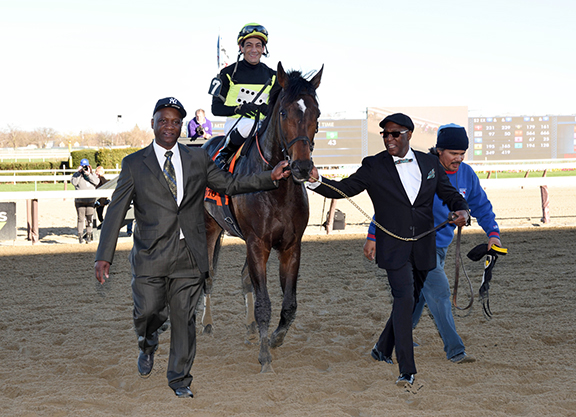By Bill Finley
Less than 48 hours after he won a Grade I race, trainer Gaston Grant was back at work, not tending to a string of million-dollar 2-year-olds or graded stakes winners, but delivering packages for UPS in the East Flatbush neighborhood of Brooklyn. It's his real job.
For every Todd Pletcher, Bob Baffert, Chad Brown, there are probably five trainers like Grant, trainers with stables so small and, normally, so unproductive that they cannot make ends meet at the racetrack. Grant didn't train Big Brown (Boundary), but he drives for Big Brown.
But it just so happens that this small stable includes one of the top 10 sprinters in the country, one that, more or less was given to Grant for free. Plagued by inconsistency throughout much of his career, Green Gratto (Here's Zealous) has put things together this year at seven. He started off the year by winning the GIII Toboggan S. and, after a poor try in the GIII Tom Fool H., rebounded to win the GI Carter H. at Aqueduct at odds of 54-1.
“I wouldn't say I was surprised that he won because he was training good,” said Grant, who owns the horse along with his brother, Anthony. “But when you see your horse cross the wire first in a race like that you kind of go, 'wow.' That was by far my biggest thrill in racing. I only started training horses on my own about two years ago. To win a Grade I is a remarkable feat.”
Green Gratto has earned $1,100,872 for the Grant brothers, who are natives of Jamaica, but that hasn't led either to quit their regular jobs. Anthony is a contractor and Gaston said he has no plans to stop working for UPS.
“For me, the job is my security,” he said. “With UPS, I just have to show up to work and have a drivers license and it's a good paying job. I would never think of giving it up.”
The Grant family moved to the U.S. in 1979 and their father loved to play the races. He would often takes his sons to the New York tracks and Gaston decided that some day he'd like to try to get a job on the backstretch. He hooked on in 2004 with former trainer Peter Chin and worked his way up from hot walker to groom, always making sure that he got his duties done in time that he could get to work at UPS, usually by about 9 am.
Green Gratto was bred in New Jersey by Peter Kazamias's Kaz Hill Farm. Kazamias works with Chin to sell his yearlings. If he cannot find a buyer for any, he tells Chin to go out and make the best deal possible.
“I try to find a couple of friends who are not able to buy or claim horses and are interested in getting into the business,” Chin said.
Chin went to the Grant brothers and said as long as they paid the bills for two Kaz Hill Farm horses while they were being broken and trained in Florida they could keep both. There would be no other charge.
Grant decided he could not afford both and chose Green Gratto. The second horse, Anything Green (Here's Zealous), made three starts and never came close to hitting the board.
“Peter called me up and said he had two horses for me,” Grant said. “I was hesitant to take on the responsibility because I had one already and I had to think about the monthly bills at the farm. There were a lot of expenses involved, but I said `okay.' When I went to the farm, I liked Green Gratto. He was big and overpowering.”
At the start of Green Gratto's career, it appeared that Grant got what he paid for. In his first five starts, he was beaten a combined 119 1/2 lengths. He finally dropped him into a $50,000 maiden claimer at Aqueduct and he responded by finishing second. He's been a different horse ever since. He won the GIII Fall Highweight H. in 2015 and the Gravesend S. that same year. The 2015 Carter was also memorable for the connections as Green Gratto finished second at 53-1.
He was trained by Chin up until Aug. 3, 2015, when Grant took out his trainer's license and took over. Green Gratto was the first horse he ever ran under his own name, recording a second place finish in an allowance race at Saratoga.
Green Gratto went only one for 13 in 2016, but at age seven has become better than ever this year.
“I guess he's maturing. I don't know,” Grant said. “I can't say I did anything special. It happens in the sport, where horses turn around. We always believed in him and as he got older he started to mature and take care of himself.”
Grant is now training seven horses, three of which he owns along with his brother. He doesn't want his stable to get any bigger. Too many horses means too much time at the barn, and he's got another boss to please. Good UPS drivers don't show up late.
Not a subscriber? Click here to sign up for the daily PDF or alerts.






